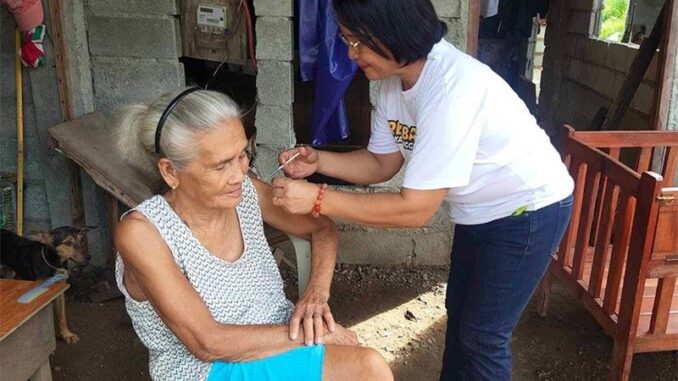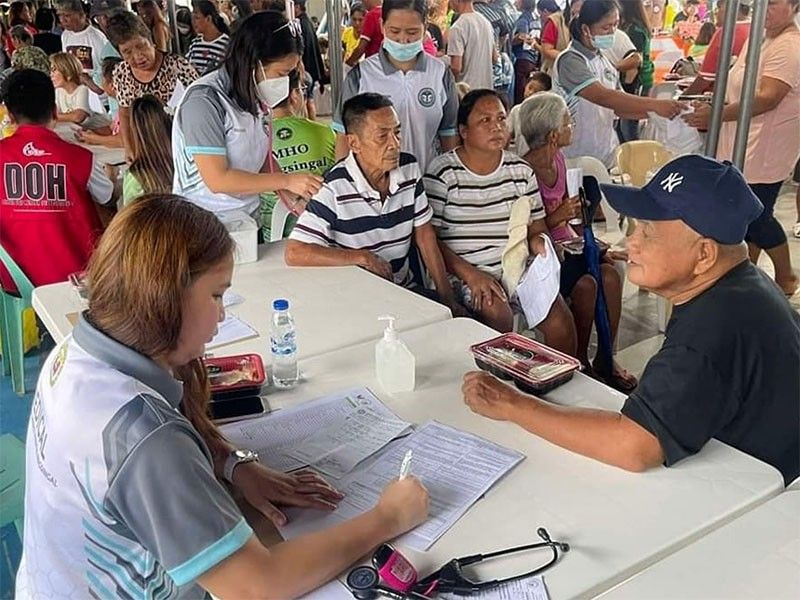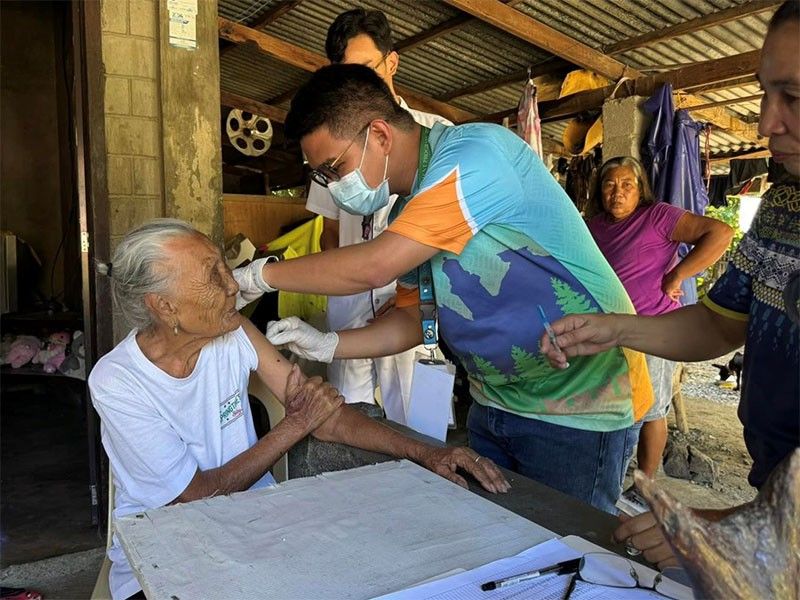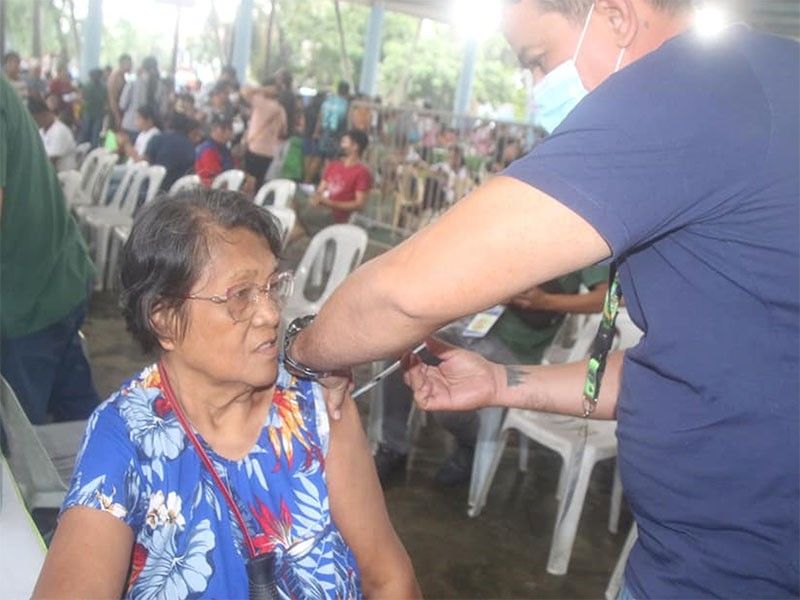
As our population continues to age, senior citizens—especially those living with non-communicable diseases (NCDs) such as diabetes, hypertension, and heart disease—remain among the most vulnerable. We know that our lolos and lolas affected by such conditions are more susceptible to infections like influenza and pneumonia, which makes timely vaccinations and proactive healthcare interventions more critical than ever.
With me during the Regional Health Connect Forum, Ilocos Norte (L-R, top row): Dr. Augusto Salalima (Phil. Heart Association), Atty. Germaine Leonin (United Senior Citizens Partylist), Dr. Christina Ignacio-Alberto (Phil. Foundation for Vaccination); (L-R, bottom row): Dr. Justin Gubatan (Department of Health, Region I) and Mr. Teodoro Padilla (Exec. Director, Pharmaceutical and Healthcare Association of the Phil.)
In celebration of Filipino Elderly Week early this October, I had the privilege of moderating the Ilocos Norte Health Connect Forum organized by the Pharmaceutical and Healthcare Association of the Philippines (PHAP). The forum brought together leaders and experts from various sectors to discuss the health of seniors in Ilocos Norte, with a focus on immunization and early detection of health issues.
The forum’s aim, as PHAP Executive Director Mr. Teodoro Padilla emphasized, was “to ensure seniors’ high quality of life and good health during their golden years.” This statement rings especially true, as we reflect on the challenges seniors face in accessing healthcare, particularly in rural areas.
It is not enough to manage chronic illnesses – we must also ensure seniors are protected from preventable diseases through timely vaccinations.
Dr. Justin Clyde Gubatan, the Non-communicable Diseases Unit Head of the Department of Health Center for Health Development in Region I highlighted the dual approach needed for effective senior care: managing NCDs while ensuring immunization against severe infections. His insights underscored the need for collaboration between local governments, health offices, and stakeholders “to provide comprehensive services that not only control NCDs but also shield seniors from severe infections like the flu, improving their quality of life and reducing the financial burden on families and the healthcare system.”
Agencies and offices join the call for early prevention
The importance of empowering seniors with knowledge cannot be overstated. Early detection of health issues coupled with regular check-ups and healthier lifestyle choices can significantly enhance their long-term well-being.
Dr. Augusto Niccolo Salalima, a member of the Council of Preventive Cardiology of the Philippine Heart Association, shared with the forum the role of health education and its benefits for our lolos and lolas. Dr. Salalima succinctly explained the benefits of regular check-ups in five points: “it helps people be more careful about their health, transform the unknown to the known, identify the risk of many chronic diseases, save money, and be productive.”
Additionally, he also shared several guides released by the Department of Science and Technology – Food and Nutrition Research Institute (DOST-FNRI) in 2023 — the Pinggang Pinoy for Elderly and the Filipino Pyramid Activity Guide — which illustrate the ideal diet and range of activities our lolos and lolas can adopt to keep their bodies healthy. Another practical reminder was the American Heart Association’s “Life’s Essential 8,” a lifestyle guide to improve heart health.

The Department of Health (DOH) Ilocos Region brings the “PuroKalusugan” program to Ilocos.
We also heard from Dr. Medeldorf Gaoat, Senior Board Member and Chair of the Committee on Health from the Provincial Government of Ilocos Norte, who outlined initiatives such as the “Capitol Express.” This program deploys provincial government services directly to remote barangays, ensuring that even seniors in far-flung areas have access to essential healthcare.
According to the Commission on Population, seniors are set to make up 14% of our population by 2030 to 2035. This trend makes it clear that legislative action is urgently needed to prioritize elderly healthcare and promote healthy aging. I believe this is a cause that deserves the concern of the general public, after all, tatanda din tayong lahat!
I’m happy to share that according to one of our speakers at the forum, efforts are already underway. One was shared with us by Atty. Germaine Trittle Leonin, representing Congresswoman Milagros Magsaysay of the United Senior Citizens Party list. At the top of her wishlist is establishing a hospital for lolos and lolas, the proposed Philippine Center for Geriatric Health through House Bill No. 7305. There is also House Bill No. 7305 that seeks to provide universal social pensions for seniors with increased discounts on medicines and groceries.

In observance of Filipino Elderly Week, the Prov’l. Health Office-Public Health Office of Ilocos Norte partakes in a free administration of the pneumococcal polysaccharide vaccine for seniors.
It takes a village to care for lolos and lolas
These initiatives offer hope for a future where seniors receive the healthcare and support they deserve, regardless of their location or economic status. “This is our dream, which has also gotten the support of the president,” Atty. Germaine told the forum.
Apart from these, there are also efforts to revitalize Barangay Botikas, which is also adjacent to taking a more serious and closer look at the mental health of senior citizens. The other measures being tackled in Congress that Atty. Germaine shared with us made us hopeful for the future of services for our seniors: from better social security mechanisms to improved nursing home and assisted living services and facilities, and more.
As we face the inevitable demographic shift toward an aging society, we must remember that caring for our elderly is a collective responsibility.
Dr. Maria Cristina Ignacio-Alberto of the Philippine Foundation for Vaccination reminded us that “healthy aging requires a multi-sectoral approach.” Laws, health programs, and public awareness campaigns must address the growing burden of NCDs while promoting vaccinations to prevent disease.
In the words of PHAP’s Executive Director Mr. Teodoro, “We will always be indebted to our mothers, as I am, and I believe everyone here feels the same for their aging parents, family members, and friends. It is high time that we take care of them and their health.”

DOH Region I’s “PuroKalusugan” program provided immunizations, free medicines, and conducted the Philippine Package of Essential Non-Communicable (PhilPEN) health risk assessments for seniors.
My congratulations and thanks to the organizers and participants of PHAP’s Ilocos Norte Health Connect for putting together an insightful discussion. As we honor our lolos and lolas, let us not only reflect on their contributions to our society but also commit ourselves to ensuring their health, dignity, and well-being. After all, the way we care for our elderly is a reflection of who we are as a nation.
——
Follow my social media accounts JingCastaneda: Instagram, Facebook, YouTube, Tiktok and Twitter. Please share your stories or suggest topics at editorial@jingcastaneda.ph


Be the first to comment